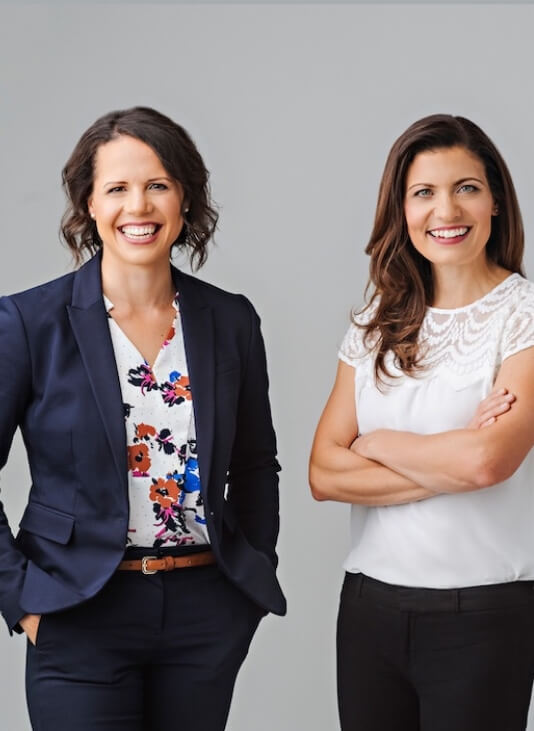Please note that we will be discussing weight and weight-related terms in this blog and acknowledge that this can be sensitive and triggering material for some readers.
Have you noticed that since Blueprint Nutrition was born September 2016, there have been essentially zero blog posts regarding our formal stance on weight and weight loss? You may wonder why, especially if you are a former or current client of ours, or you follow us on our blog or social media channels.
Here’s the scoop:
Within the field of dietetics, there is a large and ever widening chasm of opinions, beliefs, and stances on weight and its relationship to health. Even though dietitians and other health professionals all read the same research articles, our own experiences and influences all work together to shape our conclusions and leads all of us to a variety of opinions about the latest research.
Both of us have done a lot of work in nutrition and weight loss counselling since our university and internship days. We have spent a lot of money and time attending conferences, participating in journal clubs, reading books, participating in webinars and trainings, and counselling clients for a combined 24 years.
And what we have discovered is that on the wide spectrum of views about weight loss and dieting, we lie somewhere in the muddy middle.
The grey zone.
The ‘definite maybe’ district.
Whatever you want to call it – that’s where we are.
It’s not a cop out, nor is it a cover. It’s a legitimate place to hold space.
Our views shared in this article will not be the same views shared by other dietitians. We’re okay with that, we hope that other dietitians will be as well. We believe that having a spectrum of opinions is good for our profession so that it can continue to advance and each camp can be challenged in his or her thoughts. We also know with certainty that our stance will continue to evolve over time as we learn more, gain more experience, and research and social policies improve.
So, what follows is our “we believe” statements about weight management that we apply in our private practice when working with clients. Each could be a 3-part blog series or more on their own. We have done our best to summarize and hope to more fully explore and explain each one in the future.
But before we go any further, we think it is imperative to acknowledge the lens through which our stance and understanding of weight is built upon.
Both of us (Cara and Rosanne) grew up in food secure households; finances were never a significant stressor and we were raised in loving and supportive families. Although both of us have been subjected to the ill effects of diet culture, neither of us have significantly battled with our weight or been exposed to weight stigmatization. As able-bodied white “thin” women, we recognize that this comes with advantages and we have not endured systemic weight discrimination that others have.
With that being said, here is what we believe about weight:
1. Diet culture has messed us up.
The global weight loss and weight management market was valued at $168.95 billion in 2016 and is projected to reach $278.95 billion by the end of 2023 (more details here). There is a lot of money to be made and diet culture thrives on you feeling terrible about your weight, no matter your size. When there is that much money to be made, there will be many after even a small slice of the billion-dollar pie.
Even the diet industry is aware that dieting doesn’t work and so many diet companies have rebranded using the words “health, wellness or lifestyle” even though the product/service is the same. Those words sound much more inviting and wholesome. We have no qualms with the words themselves, it’s just unfortunate how diet culture has hijacked them.
The problem is however that many of us are so deeply entrenched in diet culture that it’s hard to recognize this as problematic. And if you weren’t wasting 90% of time your time and energy constantly thinking about your stomach, thigh gap or your food intake, then what would you do?
2. It’s okay to want to lose weight but we don’t focus on weight loss.
We understand the desire to lose weight considering our society’s standard of beauty, status and worth being associated with the image of “thin and strong”. We also understand that most people hold the belief that thin equals healthy, and often justify their pursuit of weight loss in the name of health.
However, when you look at the research and see that diets fail (in the long-run) over 95% of the time, wouldn’t you be upset if your dietitian recommended “x” amount of weight loss, all the while knowing it would likely not happen and that even if a significant amount of weight was lost initially, you would be more than likely to re-gain that weight plus more? Put another way, would you want your doctor to prescribe a medication that was effective in only 5% of cases and would put you at a 95% risk of getting sicker?
So, while we firmly believe you have the right to want to change your weight, we want to focus on teaching you more about sustainable changes to your thoughts and actions that will benefit your physical and mental health, not damage it.
These changes will do one of three things to your weight: 1) increase it, 2) decrease it, or 3) maintain it.
We have had clients with all three outcomes.
The scale will do what its going to do. You cannot physically make the needle move but you can adjust your pattern of thinking around food and your relationship with food into something that is life-giving, not energy-draining or full of guilt or shame.
3. There is no nutrition approach that fits everyone.
Despite many reoccurring themes that surface when working with individuals on the topic of weight, we don’t offer cookie cutter programs because there has never been, nor will there ever be, two clients with identical needs.
In our practice, we work primarily with women seeking nutrition advice to optimize health or recovery from diet culture, and athletes seeking improved performance or recovery from diet culture. (We do counsel parents who are concerned about their child’s weight, but that’s another blog for another time).
We will employ different strategies within and between these groups. For instance, we may track body composition alongside detailed nutrition recommendations in an aspiring NHL hockey player or competitive sprinter if we believe he or she is a good candidate for this approach to achieve his or her short-term goals, while fully explaining the risks/benefits. Alternatively, if we were helping a client recover from a long history of dieting, we would not measure weight or body composition. Period.
Having recognized that nutrition is highly individual, we also believe that different patterns of eating can be followed and should be respected. From vegetarian and vegan diets, to Mediterranean diets, lower carbohydrate diets, counting macros, high fibre diets and many varieties in between, we believe that they can all *potentially* fit, if, the pattern of eating for you is life-enriching and doesn’t breed obsession around food or disordered eating.
4. Health can be achieved at many different sizes.
We believe in the Health at Every Size (HAES®) approach which “acknowledges that weight is not a behaviour or personal choice and that normal human bodies come in a wide range of weights and shapes. HAES® seeks alternatives to the overwhelmingly futile and harmful practice of pursuing weight loss.” Principles of HAES® include:
- Weight inclusivity
- Health enhancement
- Respectful care
- Eating for well-being
- Life-enhancing movement
For those of you who have not heard of this concept before, we would encourage you to read this website for more information. This video does a really good job of introducing the topic.
5. The concept of Intuitive Eating.
Intuitive eating can best be described as: “an evidence-based, mind-body health approach, comprised of 10 principles created by two dietitians, Evelyn Tribole and Elyse Resch in 1995. The principles work by either cultivating or removing obstacles to body awareness. It is a personal process of honoring health by listening and responding to the direct messages of the body to meet your physical and psychological needs.” Those 10 principles include:
- Rejecting the diet mentality
- Honouring your hunger
- Making peace with food
- Challenging the food police
- Respecting your fullness
- Discovering the satisfaction factor
- Honouring your feelings without using food
- Respecting your body
- Joyful movement
- Gentle nutrition
Although we regularly employ the tools of intuitive eating, they may or may not be a starting place for our sessions. For some of our clients, listening to internal cues is almost impossible initially if they have not been in touch with their body’s signals for a long time. In these situations, we have found that talking about some nutrition strategies at first can open up a more successful dialogue in subsequent appointments. Again, its a highly personal approach – not cookie cutter.
6. The concept of best weight.
“Best weight” is a term that was coined by Dr. Arya Sharma (founder and Scientific Director of Obesity Canada) who describes this as “whatever weight a patient achieves while living the healthiest lifestyle they can truly enjoy. There comes a point when a person cannot eat less or exercise more and still like their life. The weight they attain while still liking their life is thus their best weight. If food cannot be used to comfort or celebrate or if there is a long list of forbidden foods, they are on a diet and diets fail over 95% of the time.”
What we like about the concept of “best weight” is that any changes you make to your diet and lifestyle should be life-giving. If these changes are enjoyable, sustainable, do not negatively impede your work, relationships or life, do not foster disordered eating behaviours, and are not limiting your ability to enjoy food to celebrate, comfort or use in other ways that are life-enhancing, then we support you. Your body will find the weight in which it is happiest and healthiest.
We believe in a “best weight” that is not achieved through deprivation. The human body was not divinely created to thrive off restriction, either physically or mentally.
7. Evidence-based practice.
If you are looking for a dietitian to justify your purchasing of apple cider vinegar pills for weight loss (or any other garbage diet culture product) then we’re not the best fit for you. We recommend strategies that are based on evidence, with the acknowledgement that awkwardly enough, evidence has its flaws too.
8. And that evidence-based practice only goes so far …
While we read a lot of research, listen to webinars, attend conferences, and challenge our beliefs with literature from other viewpoints, we acknowledge that research in and of itself only takes you so far and has many biases, as we have discussed before.
It is our unique counseling experiences as dietitians that account for remarkably more of our approach with clients than the recommendations from journal articles. With our 24+ years of experience comes maturity of thought and understanding regarding the best path for our clients. One of our clients said it best when she remarked that our sessions together were more like “life therapy” than “nutrition therapy”.
Once self-respect leads into self-love, it paves a way for our clients to see their bodies in a new light and is much easier to talk about food and enjoyable movement.
9. Your body size is the least important thing about you.
We care about you as a person, including your own unique gifts, talents and abilities, much more than we care about your clothing size. As we begin to understand more about who you are and you allow us to enter your world, we can better help you to determine what barriers need to be broken down and which walls may need to be rebuilt again.
Our obsession with thinness in the name of health is literally making us sicker – the mental capacity and energy that is wasted on this pursuit is staggering and deeply disturbing. Diet culture preys on women and counts on the fact that they despise the way they look. Many women are victims and have accepted a lifetime of self-loathing as the status quo. We believe that true change comes from a place of self love, acceptance, and positivity. Our goal is to empower you to care for your body because you love yourself not because you hate yourself.
One of the reasons why we continue to prefer seeing our clients in-person (although we do accept clients via virtual counselling services) is that we find that face-to-face human connection breeds a level of vulnerability and authenticity that is sometimes more challenging to accomplish over a computer screen. When our clients can be courageous and vulnerable with us, that is where we find the power of change truly happens.
10. Change takes time.
We can likely all agree that change does not happen instantly. If you’re looking for one session to give you a bunch of handouts and send you on your way, we are not the best fit for you.
If, however, you are interested in working through the tough stuff (the ice berg under the water stuff), “rumbling with vulnerability” (to quote Brenee Brown) and changing your thought and action patterns to work for you, not against you, then we’re the jam to your peanut butter – aka – we’ll make a good sandwich, or team.
It is not uncommon for us to see clients for anywhere from 6-8 or even up to 18 sessions. Like we said earlier, there is no set/prescribed amount of time – it’s about what you need and that we won’t know until you start doing the work.

We hope that this has been helpful for you as you consider whether our philosophy around weight aligns with yours. We welcome your thoughts, comments and feedback.
Take it one bite at a time,
Cara and Rosanne






